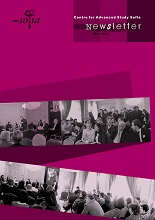
CAS Newsletter 2011/2012
Articles, pictures and interviews can be reprinted only with the consent of Centre for Advanced Study Sofia (CAS - Sofia). Any citations should be duly acknowledged.
More...We kindly inform you that, as long as the subject affiliation of our 300.000+ articles is in progress, you might get unsufficient or no results on your third level or second level search. In this case, please broaden your search criteria.

Articles, pictures and interviews can be reprinted only with the consent of Centre for Advanced Study Sofia (CAS - Sofia). Any citations should be duly acknowledged.
More...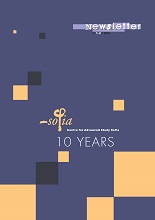
Articles, pictures and interviews can be reprinted only with the consent of Centre for Advanced Study Sofia (CAS - Sofia). Any citations should be duly acknowledged.
More...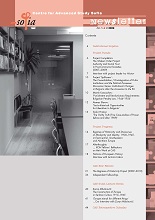
Articles, pictures and interviews can be reprinted only with the consent of Centre for Advanced Study Sofia (CAS - Sofia). Any citations should be duly acknowledged.
More...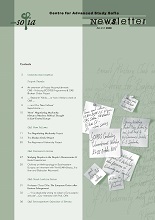
Articles, pictures and interviews can be reprinted only with the consent of Centre for Advanced Study Sofia (CAS - Sofia). Any citations should be duly acknowledged.
More...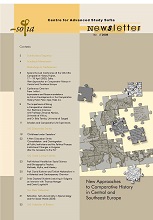
Articles, pictures and interviews can be reprinted only with the consent of Centre for Advanced Study Sofia (CAS - Sofia). Any citations should be duly acknowledged.
More...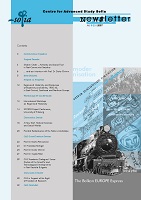
Articles, pictures and interviews can be reprinted only with the consent of Centre for Advanced Study Sofia (CAS - Sofia). Any citations should be duly acknowledged.
More...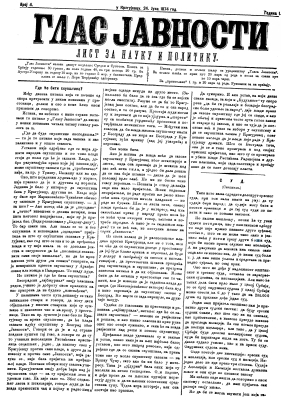
Где Ће бити скупштина?; СУД; Азбука социјалних наука - По руском аутору; И3 НАРOДА; КРАГУЈЕВАЧКЕ НОВОСТИ; КЊИЖЕВНЕ ВЕСТИ; „Р А Д“ - КЊИЖЕВНИ И НАУЧНИ ЛИСТ; ЈАВНА КОРЕСПОНДЕНЦИЈА; ОГЛАСИ; ПРИЧЕ 3А ДЕЦУ; ОБЈАВА;
More...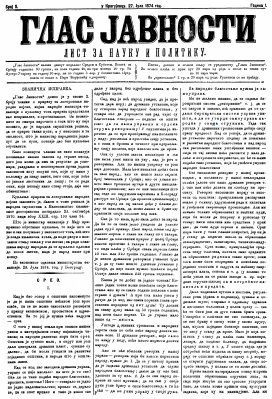
ЗВАНИЧНА ИСПРАВКА; СРЕ3; Крађа у Пожаревцу; Азбука социјалних наука - По руском аутору; Уреднику „Гласа Јавности“; ИЗ НАРОДА; КРАГУЈЕВАЧКЕ ИОВОСТИ; ЧИТАПЦИМА „ГЛАСА ЈАВНОСТИ"; КЊИЖЕВНЕ ВЕСТИ''РАД“ - КЊИЖЕВНИ И НАУЧНИ ЛИСТ; ОГЛАСИ; ПРИЧЕ ЗА ДЕЦУ ; ОБЈАВА;
More...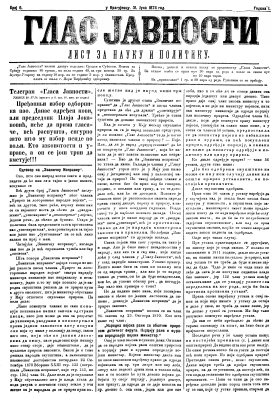
Телеграм «Гласа Јавности«; Одговор на „Званичну Исправку“; Азбука социјалних наука - По руском аутору; СРЕЗ; ИЗ НАРОДА; Браћи Пожаревљанкма; КРАГУЈЕВАЧКЕ НОВОСТИ; ПРИПОСЛАНО; Нек се зна с питањем; ЧИТАОЦИМА „ГЛАСА ЈАВНОСТИ“; ОГЛАСИ; КЊИЖЕВНЕ ВЕСТИ; ''РАД'' - КЊИЖЕВНИ И ЕАУЧШТ ЛИСТ; ПРИЧЕ ЗА ДЕЦУ; ОБЈАВА;
More...
Svaki jezik mora u lingvistici imati svoje ime. Nazivi koji pišu u današnjim ustavima hrvatski jezik, srpski jezik, bosanski jezik nisu za lingvistiku prihvatljivi jer „sva tri imena trenutno označavaju jedno te isto, a budući da različita imena sugeriraju različitost, iz toga proizlaze problemi” (Raecke 1996: 22).
More...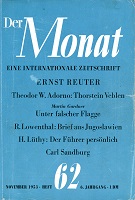
Please download/open the Introduction-PDF which you find below to see en détail what you can find in this issue Thank you.
More...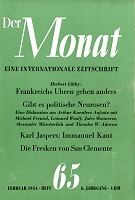
Please download/open the Introduction-PDF which you find below to see en détail what you can find in this issue Thank you.
More...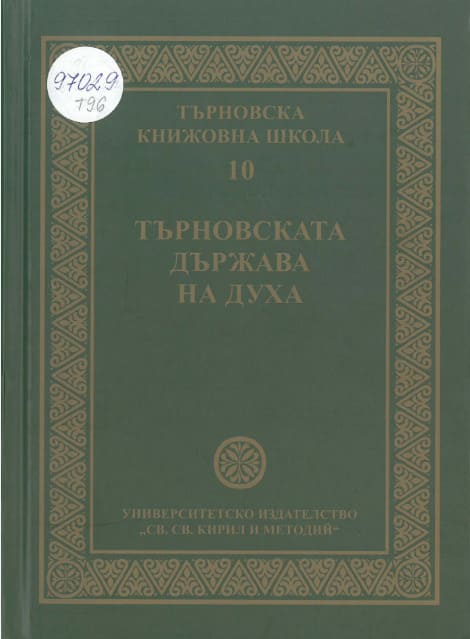
The article treats the means of expression of hesychastic apophaticism, used by Old Bulgarian writers of the 14th – 15th centuries, and the author tries to show that these means are very old, and were characteristic even for the mind of primitive people. He pays attention to the synonymy of ‘aphophatic’ negative pronouns and ‘cataphatic’ summative pronouns; to the pleonastic use of the negative particle не; to the syntactic but- constructions; and to necessative constructions.
More...
The presented disertation deals with selected essayists associated around the polish exile magazine "Kultura" published in maisons-laffitte in paris in the second half of the 20the century (1946-2000). its managing editor was Jerzy Giedroyc. the oeuvre of the closest magazine associates (so called "kultura group") is disscussed with regard to the aspects of the art of essay. research in this paper is limited to the so called first generation of the culture associates (1946-69). apart from the spiritus agens of the periodical - jerzy giedroyc, the analysis looks in detail at these personae from the closest magazine circle: witold gombrowicz, jerzy stempowski, konstantyn a. jeleński, gustaw herling-grudziński and józef czapski. essay as such goes beyond mere literary genre. at the basis of this texts of this nature lie more general attributes and essay can be placed among texts structured by strict logic and texts so called "litterary". as such, these are grasped in the sense of a statement inferred from several basic principles, whereas literary texts as those of which structure is based on digressions.
More...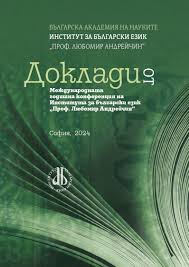
As an object of research, the lexical richness of the South-Western Bulgarian dialects attracts a considerable philological interest on behalf of such prominent figures as Yordan Hadzhikonstantinov-Dzhinot, Stefan Verkovich, Lyuben Karavelov, Vasil Cholakov who focus upon both public life and relation between the written and spoken form of the language characteristic of the third quarter of the 19th century. This richness is studied in a number of publications to be found in the periodicals from that period and presented in the form of integral components or small dialect dictionaries appended to the folklore collections. This interest is provoked by the archaic traits of these dialects preserving vivid traces of the old Bulgarian heritage, on the one hand, and, on the other, by the focus on the Bulgarian dialects characterizing the period of Bulgarian national revival in connection to the establishing of the standardized Bulgarian literary language in which, to a greater or lesser extent, the characteristic features of the Eastern Bulgarian dialects start to dominate in the new linguistic normativity.
More...
The paper is a continuation of the author’s long-term research, in which an attempt was made to collect and classify the ethnocultural lexicon related to the Ethnolinguistic Dictionary of the spiritual and material folk culture of the Bessarabian Bulgarians in Ukraine. The terminology of the culinary lexicon of the Bulgarians in the diaspora is an expression of the national specificity of the culture, and in this sense, its study is prospective within the emerging trends of European thinking from the beginning of the 21st century. The gathered lexical material is formed as a corpus of folk terms related to the culinary lexicon of the Bessarabian Bulgarians.
More...
Based on authentic materials from the Romanian Linguistic Atlas (ALR II s.n.), examples of Romanian words are selected from the semantic field of water, fishing, and fish names. We focus on words of Slavic origin,more specifically, words with a Bulgarian and an Old Bulgarian etymology. Besides their linguo-geographic distribution and their areal properties – such as a wide distribution or limited attestation in the form of a so-called relic island – we examine: What other synonyms with non-Slavic etymologies does the respective word have, and can certain patterns be identified? In addition, we look at the phonetic variability of words and typical word formation processes. Furthermore, we attempt to draw possible conclusions about the region’s historical development. In their unpublished talk of 2016, Dahmen, Popovici conclude that most of the fish names in these areas are of Slavic origin,which testifies to the intensive settlement of Slavs in the lowlands and on the banks of the Danube River, which is supported by archaeological findings. It also confirms the traditional local Bulgarian-Slavic subsistence strategy of fishing. The word roots of many fishing terms are traceable back to the times of the Proto-Slavic homeland, so again we can confirm that fishing was a typical subsistence strategy of native Slavs.
More...
The paper analyzes the semantics, lexicography and main contexts of use of the Bulgarian verb заварвам, with special attention to folklore, rituals and folk speech, on the ground of ethnolinguistic methodology. It also studies the words formed from the same root завареник, завареница (step-children), преварник (a ritual person at a wedding), etc. Synonymic vocabulary with other stems from the Bulgarian dialects (затичам, затечено дете, затичняк), including borrowings (Greek в/фтасам), and the semes that determine the convergence of the lexemes are indicated. The Balkan character of the greeting Добре дошъл – Добре заварил is shown; the ways of further research of the semantics of ‘to catch up’ in Slavic and Balkan languages are outlined
More...
The article examines the antonyms in the field of the concept TOLERANCE. Survey data are analyzed seeking an answer to the question of how the Bulgarians perceive tolerance, whether they accept it as a value. Groups of antonyms united by a common semantic feature are derived, as well as the leading oppositional pairs that build the attitudes of the modern Bulgarians. Nationally specific stereotypical signs of this value-marked concept are revealed.
More...
This paper presents the work on compiling a bilingual corpus that demonstrates the syntactic realisation of the conceptual description of verbs in English and Bulgarian and in a broader context, facilitates cross-linguistic studies by providing the foundation for theoretical and practical observations based on the two languages. The compilation of the corpus relies on the universal aspects of conceptual description and syntactic realisation by harnessing the main structural principles of the two main resources employed (WordNet and FrameNet), allowing for cross-linguistic alignment and transfer of information from one language to another (in this case from English to Bulgarian) and between resources, in particular transferring the semantic description from FrameNet onto the verb synsets in WordNet. The resulting resource links the semantic level of the conceptual frames and the frame elements with the syntactic level (couched in the form of patterns representing the syntactic realisation of the frame elements in terms of their syntactic categories and grammatical function).
More...